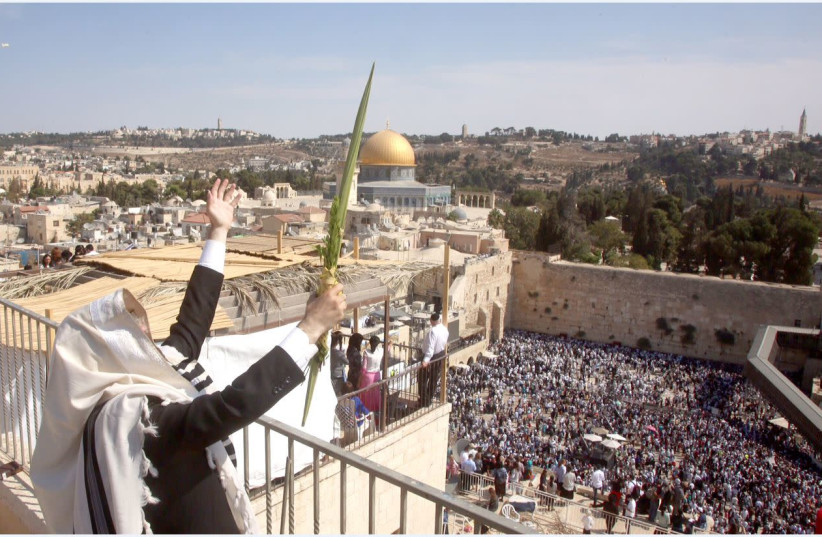This Sunday evening, we will go into the sukkah and celebrate Sukkot, the Feast of Tabernacles, for seven days, followed by Shmini Atzeret and Simhat Torah. Sukkot has singular commandments and customs.
Sukkot: A holiday of happiness
First, happiness is a central characteristic of this holiday. There is an ancient custom that even existed thousands of years ago in the Temple in Jerusalem – to celebrate Simhat Beit Hashoeva every evening of the holiday in song and dance, to fulfill the biblical commandment “And you shall rejoice in your festival,” referring directly to Sukkot.
Sitting in the sukkah, using the lulav
Second, we sit in the sukkah, a structure covered with a transient roof made of branches. Third, we have the commandment of “netilat lulav,” the Four Species – blessing the lulav (palm branch), etrog (citron), hadassim (myrtle) and aravot (willow) every day of the holiday.
These unique characteristics raise the question: What is the message of Sukkot? What is the experience we are called upon to have on this holiday, and what understandings are we meant to reach? Let’s delve a bit into the general meaning of Jewish holidays.

What is the message of Sukkot?
Life is full of an array of experiences and emotions: joy, sadness, mourning, excitement, anger, enthusiasm, love, boredom, curiosity, yearning, remembering, hoping, serenity, anxiety… to name but a few without going into detail.
Emotions do not naturally occur in isolation. Often, we experience several emotions simultaneously. For example, someone starting a new job could be happy, stressed, enthusiastic, excited, nervous, curious and even disappointed. When something significant happens, like getting married, the range of emotions is vast and profound while being very intense. A person’s soul is deep and wide enough to contain a wide array of emotions together.
In our religious life as well, in our relationship with God, we experience an array of emotions. As far as the Torah’s commandments, we are told “and you shall love the Lord” and “you shall fear the Lord.” Is there a contradiction between loving and fearing?
As mentioned, our souls are capable of containing different emotions. We have many other feelings relating to God besides love and fear. We are grateful for the abundance God gives us, sad about the distance we sometimes feel from Him – as individuals or as part of the collective. We remember the rich history of our relationship with God, expect Him to provide for us, feel spiritually close to Him, and more. Sometimes these emotions are felt all at once, and that’s OK. That is how the soul works and that is how we live.
Jewish holidays are geared to awakening this richness of emotional experience. Each holiday turns our attention to a specific religious experience in order to strengthen its influence on our souls, and so that influence stays with us throughout the year.
Thus, on Passover, we focus on the memory of the Exodus from Egypt and the significance of our being chosen as a nation with a historic mission; on Shavuot, we examine the significance of receiving the Torah and the powerful role given to us; on Rosh Hashanah, we experience the coronation of God as King who judges His subjects; and on Yom Kippur, we focus on becoming purified and sheltering under God’s wings.
SO, WHAT religious experience do we have on Sukkot? What is its focus? On Sukkot we acknowledge the abundance of goodness we have been given, with our gratitude based on the recognition that all we have was given to us by God; without His gifts, we would have nothing.
This is not just about food, money and worldly goods but also about our very existence, our ability to live and be creatures with intelligence and moral sensitivity, to be able to create familial and social relationships – all these are given to us by God. Also what we attain or acquire through hard work – also for these, we thank God for our ability to work hard, invest energy and build.
We express this acknowledgment through the commandments and customs of Sukkot. Sitting in a sukkah with a temporary roof epitomizes our dependence on God’s grace and the fact that even something as basic as a roof over our heads is not something we can take for granted. The Four Species are how we express our joy about the richness of the natural world that bursts with varied and vibrant life. And, of course, the happiness of Sukkot is the pure expression of recognizing the divine grace that envelops us at all times.
When Jews get together on Sukkot, they gather around the table in the sukkah, take a drink, and wish one another “L’chaim!” – to a life of blessing and abundance, to a life of faith and grace, to a life of joy and gratitude. We wish us all – L’chaim! Happy Sukkot! ■
The writer is the rabbi of the Western Wall and Holy Sites.
